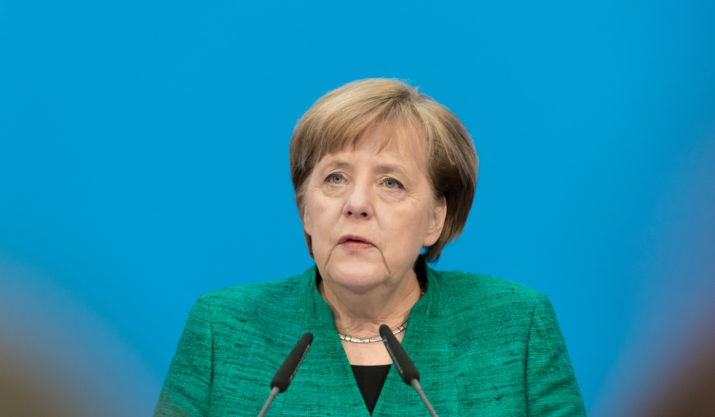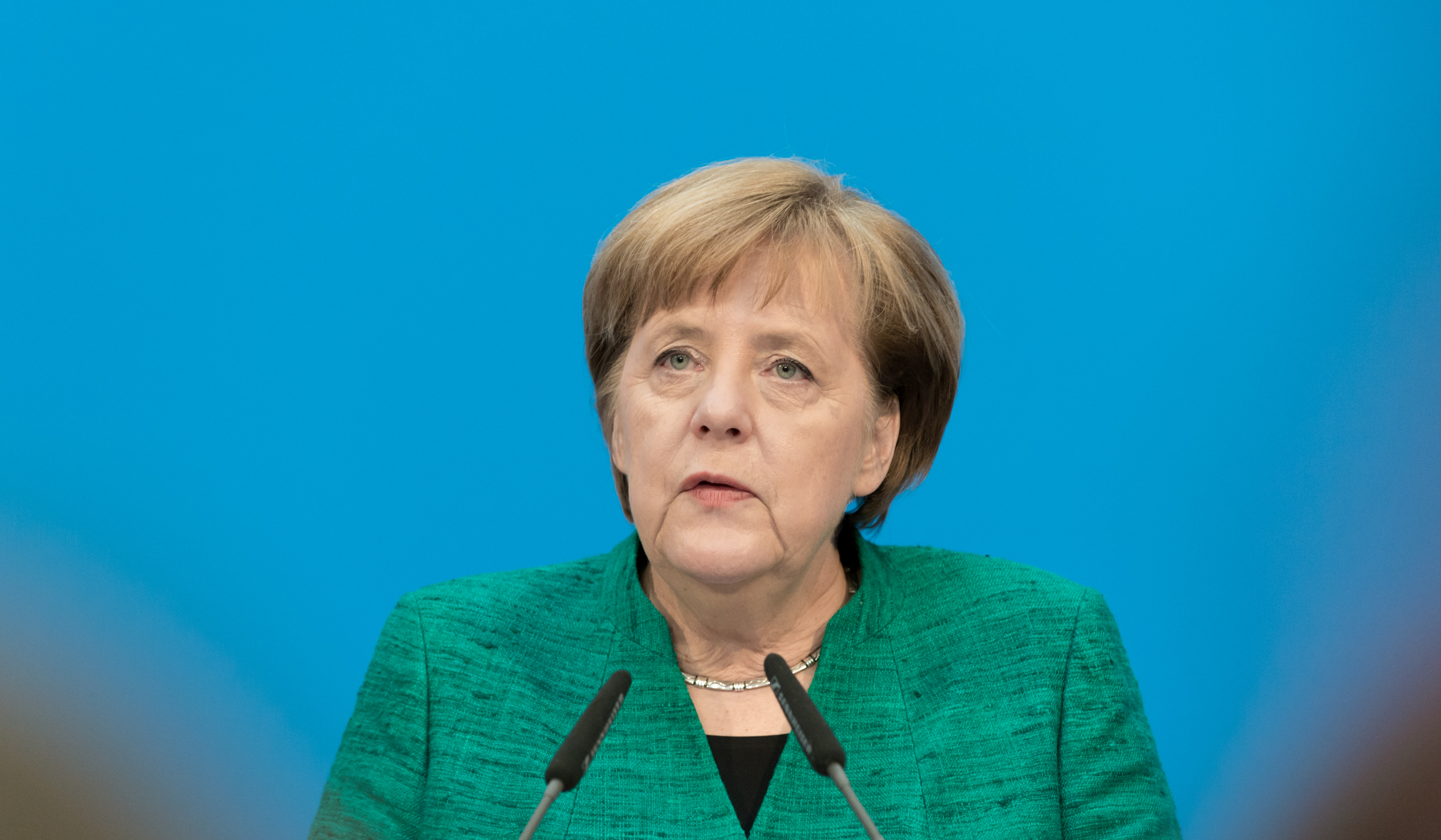
Captivity or Interdependency? A German-Libyan Parallel to the German-Russian Energy Trade

At a meeting in Brussels two weeks ago, US President Donald Trump berated the German Chancellor Angela Merkel for her country’s imports of Russian natural gas. Apparently, in the interest of promoting American liquified natural gas (LNG) exports, Trump quoted a wildly exaggerated statistic that Germany received upwards of 70 percent of its energy from Russia and concluded “Germany, as far as I’m concerned, is captive to Russia because it’s getting so much of its energy from Russia.” Referring to the anticipated Nord Stream 2 pipeline from Russia to Germany, Trump insisted that “[w]e have to talk about the billions and billions of dollars that’s being paid to the country we’re supposed to be protecting you against.”[1]
Although the German Foreign Minister patently denied being so deeply beholden to a foreign power[2] and Trump – apparently abnegating his critique of just a few days before – walked back his remarks on the pipeline after meeting with Russian President Vladimir Putin a few days later,[3] it is nonetheless worth pondering the assumption of Trump’s critique: that energy dependency necessarily leads to “captivity.” There is no denying Germany’s dependence on Russian oil and gas, even if the numbers are less sensational than Trump suggested. In 2015, Germany imported nearly one-third of its natural gas from Russia, in addition to nearly 40 percent of its crude oil. In all, this constitutes 9 percent of Germany’s total energy consumption.[4]
Such dependencies, however, are not new to German history. Nor are they as unidirectional as the characterization above implies. The first discoveries of oil in Libya in 1958 instigated a western scramble for Libyan concessions. The following year, Libya became home to the only proven foreign fields claimed by a German company, Gelsenberg AG. Because of Libyan crude’s light and sweet (high API gravity and low sulfur) qualities and location along the southern Mediterranean littoral, it quickly found markets in Europe and, above all, the Federal Republic.
Owing to a lack of domestic sources, the heavy presence of American internationals in its industry, and the consequent stunted growth of indigenous companies, the largely American producers found eager customers for their Libyan production in West Germany.[5] What is more, German demand was growing drastically. Over the next decade, total German oil imports increased fivefold, as imports from Libya grew from 200 thousand tons annually in 1959 to 40.5 million ten years later. By 1969, West Germany relied on Libya for nearly 42 percent of its crude oil, and non-German companies for the clear majority of that.[6] At its peak, the Federal Republic received more crude from Libya than from the next six producers combined.[7]
This historic reliance on Libyan oil helps contextualize the controversy around Germany’s contemporary consumption of Russian oil and gas. It also reminds us that, when assessing dependency, it is important to examine the reciprocal linkages it engenders. Dependency, it turns out, is rarely a one-way street. Libya proved just as dependent on German petrodollars as West Germany was on Libyan oil, and this reciprocity frequently led to policies that were favorable to the Federal Republic. Libya long expressed a preference for Germany, which had never been a colonial power in the region and, in fact, had a history of anti-colonial activities surrounding and during both World Wars.[8] This encouraged the favor of the Libyan King Idris al-Senussi and his Petroleum Ministry who were content to forge these ties with a country who was not as overtly colonial or neocolonial as the other western powers. Although the former could not actually direct oil to German markets, they tried, granting four German firms concessions in 1958 and a striking thirteen out of forty offered in 1966.[9] Although these concessions proved unproductive, German companies were represented here to an extent that they were nowhere else in the producing world through the 1970s.
Even more beneficial to West Germany, Libya was plying the German oil industry with reliably growing quantities of high quality crude. By 1964, Libya relied on German markets for 45 percent of its production.[10] Thus, dependency is not only a question of imports, but also of exports. Moreover, it is more than just a matter of numbers. As much as these ties worked to the advantage of Libyan state revenue, so too did they link the two countries in monetizable and non-monetizable ways that benefited West German interests. For example, when the Federal Republic exchanged ambassadors with Israel in 1965, nearly all members of the Arab League severed relations with West Germany. Among the three states that refrained from terminating relations with Bonn was Libya.[11] This provoked anti-government and anti-German protests, as well as “systematically planned assaults” against the petroleum installations of Esso, BP, and Bunker Hunt.[12] Under intense popular pressure, as well as the advice of his own prime minister, Idris temporarily withdrew his ambassador from Bonn but refused to officially sever political ties.[13] Gelsenberg management was not alone in observing, “The economic connectedness of both lands has reached the level of a meaningful political issue, as the Libyan government did not follow the decision of the Arab League – in Egypt’s tow – to break diplomatic relations with the FRG.”[14] The oil trade, the totality of Libyan exports to the West Germany, were this economic link.
In 1967, regional tensions flared again. This time, however, they broke in the Six-Day War. Demonstrations and violence erupted in Tripoli almost immediately and soon spilled across the country and spread to the oil companies – German included – and western embassies.[15] Strikes broke out among Libyan students and petroleum workers. Some protesters demonstrated specifically to deprive Libyan oil to West Germany, at times even holding German tankers at sea.[16] The Libyan government was forced to shut down production for twenty-seven days, but bucked Arab League pressures to participate in the first pan-Arab boycott targeted at American, Dutch, and British markets and local calls to unilaterally embargo the Federal Republic.[17] In the end, it took time, police action, and an economic squeeze,[18] coupled with the delivery of police helicopters subsidized by the German companies, to convince the government to resume exports.[19] It is also worth noting, as Ambassador Hans Seydel did, that, throughout the total embargo, “Libyan policy held strongly, consistently, and unflinchingly to its line of non-recognition of the GDR. At no point has it considered recognizing the GDR nor has it attempted to blackmail with the issue.”[20] Diplomatic ties were maintained. And, after the disturbance, oil flowed to West Germany in even greater quantities.
Interestingly, these petro-economic relations restricted Idris’ ability to comply with public and regional demands to take action at the expense of his primary export market. Unknowingly, this fed into a popular resentment that would open space for Muammar Gaddafi at the time that German-Libyan petroleum trade was peaking in 1969. Although Gaddafi ensured that the oil production resumed at pre-coup rates early on,[21] the apparent return to normalcy would soon give way to greater state control over production and pricing. As flows decreased in quantity (and regularity) but increased in price over the first few years of the 1970s, the West German downstream turned away from Libya to the petroleum-producing Saudi Arabia, Iran, and Nigeria and the petroleum- and natural gas-rich Soviet Union to ensure energy resource and source diversification.[22] By the time of the oil crisis of 1973, Libya accounted for just 23 percent of West Germany’s crude imports.
This, of course, still created an uneven petro-political balance and Libya used it to pressure Germany on the Israel-Palestine question to mixed success.[23] Tim Szatkowski has likewise shown that these continued petro-relations constricted German room for maneuver in the wake of Libyan terroristic ventures such as the Munich Massacre of 1972 and the La Belle discotheque bombing of 1986, as well as the 2011 NATO bombing of Libya that effectively destroyed Gaddafi’s waning hold on power.[24] The ties of petroleum dependency certainly worked against West German interests in many ways. It is important to recognize, however, that this same petro-political nexus also restricted Libyan actions on the questions of West German diplomatic relations and East German recognition. Through 1970, containing the German Democratic Republic (GDR) abroad had been West Germany’s chief foreign-political objective. Afterwards, its controlled roll-back, known as Ostpolitik, took its place. Despite heavy courting from an East Germany who saw a kindred, anti-imperialist spirit in Gaddafi,[25] Libya did not welcome an East German ambassador until June 1973 – four years after the first Arab states made this move and just six months after the Basic Treaty had already normalized relations between the Germanies. Petroleum ties and, increasingly, the related recycling of petrodollars back to West Germany in exchange for German finished products,[26] delayed Libya’s recognition of the GDR by several years.
The example above shows that questions of dependency and glib claims of captivity are best approached by examining the reflexive, interdependent nature of exporter and importer relations rather than fixating on one pole. Natural gas and oil constitute 38 percent of total Russian exports. The Russian economy, moreover, is still recovering from the 2014 oil price plunge.[27] It needs German markets, just as Germany needs Russian hydrocarbons. In the short term, at least, both states are captive to this reality, as is the oft mis-assessed Nord Stream 2. Barring major, unforeseen influxes in German consumption of Russian gas, the pipeline project is not about building a new dependency, but about streamlining a long-standing geographically and politically influenced interdependency. Herein lies the real issue. Russian President Vladimir Putin is pushing the new pipeline route to circumvent Ukraine while only moderately expanding energy-economic ties with a Federal Republic that is indispensable to its continued economic recovery. This gives Germany energy-political leverage that it could potentially wield towards greater regional good of a sovereign and energy-secure Ukraine, just as it did for its own petroleum and political interests in Libya. Rather than German vulnerability to the Russian “gas weapon” – an unlikely potentiality – the Ukrainian issue should be of primary concern to Berlin, as well as Washington. Berlin’s energy captivity is a hyperbolic distraction.
Nicholas Ostrum received his Ph.D. in History from Stony Brook University in 2017 with a dissertation on West German foreign-energy policy and oil company ventures in Syria and Libya. He has recently embarked on his next project, tentatively titled “Risk and Interdependency,” which examines the global reach of the German quest for hydrocarbons in the second half of the twentieth century. He is currently an instructor at Clark State Community College and a member of EuropeNow’s Editorial Committee.
Published on July 26, 2018.
References:
[1] Quoted in Steven Erlanger and Julie Hirschfield Davis, “Trump vs. Merkel: Blistering Salvo Meets Quiet Rejoinder,” The New York Times, July 11, 2018, https://www.nytimes.com/2018/07/11/world/europe/germany-merkel-russia-trump-nato.html.
[2] Ibid.
[3] Ben Geman, “Trump softens tone on Russian gas pipeline,” Axios, July 17, 2018, https://www.axios.com/trump-russias-gas-pipeline-germany-nord-stream-2-58389b35-d803-4304-b2b5-02a70efdd190.html?utm_source=newsletter&utm_medium=email&utm_campaign=newsletter_axiosgenerate&stream=top.
[4] Sören Amelang and Julian Wettengel, “Germany’s dependence on imported fossil fuels,” Clean Energy Wire, March 8, 2018, https://www.cleanenergywire.org/factsheets/germanys-dependence-imported-fossil-fuels.
[5] For an explanation of this process through a study of the Marshal Plan, see: David S. Painter, “Oil and the Marshall Plan,” The Business History Review, Vol. 58, No. 3 (1984), 359-383, https://doi.org/10.2307/3114553.
[6] In 1969, the Gelsenberg take from its fields reached 4.5 million tons, or just 10 percent, of Germany’s total Libyan imports of 40.5 million tons. Gelsenberg AG Bericht über das Geschäftsjahr 1969: montan.dok/Bochum Mining Archive (BBA) 55/857;
[7] These were: Saudi Arabia (12 million tons), Algeria (8.5 million), Oman (6.1 million), Iran (5.9 million), Venezuela (3.9 million), and USSR (3.5 million).
[8] These include the Moroccan Crises of 1905 and 1911, wartime support for Senusi rebels during the First World War, and the Nazi efforts to drive the British out of North Africa during the Second World War. The latter of these was memorialized in a monument to fallen Afrikakorps soldiers at Tobruk in 1951. For brief footage of the dedication ceremony, see: Welt im Bild, 178/1955 (November 11, 1955), Filmothek, Das Bundesarchiv https://www.filmothek.bundesarchiv.de/video/583241?set_lang=de.
[9] Bribery also played a role in these allocations. Gelsenberg Manager Herbert Westerhausen attested to the back-room activities of other German concerns, while maintaining that Gelsenberg refrained from participating due to its ties with Mobil. Airgram, Newsom, No. A-514, May 12, 1966, Subject: Petroleum: New Oil Concessions: Mobil/Gelsenberg Relations: DEA Take-Over: National Archives and Records Administration (NARA) RG59 PET 10-3 Libya B 1394. Federal officials did as well. Airgram, Blake, No. A-480, April 27, 1966, Subject: New Oil Concessions: German Embassy Comments: NARA RG59 PET 10-3 Libya B 1394.
[10] Statistics from: Bundesamt für gewerbliche Wirtschaft, Aussenstelle Hamburg, Mineralölstatistik der Bundesrepublik Deutschland, March 7, 1967; BP Statistical Review of World Energy, 2016, http://www.bp.com/en/global/corporate/energy-economics/statistical-review-of-world-energy/downloads.html.
[11] The others were Tunisia and Morocco.
[12] Telegramm, Beye, No. 103, July 22, 1965: Politisches Archiv des Auswärtigen Amts (PAAA) B36 IB4 134.
[13] Stöckl, January 15, 1966, Betr.: Libyen an der Jahreswende: PAAA B36 IB4 207.
[14] Schulte and Teller to Finanzamt Essen-Süd, Antrag auf Erlös der Vermögensteuer bei Auslandsvermöge, October 25, 1965: montan.dok/BBA 55/5714.
[15] Enno Schubert, Von Bergmann zum Ölexperten: Stationen einer Karriere (Frankfurt a.M.: R.G. Fischer, 2007), 38-9.
[16] Telegramm, Seydel, No. 68, June 13, 197, Betr.: Erdoelboykott: PAAA B66 IIIB6 536.
[17] Dr. Westerhausen, July 31, 1967, re: Erdölembargo: montan.dok/BBA 55/5683.
[18] See, for instance, Ambassador Hans Seydel’s assessment of the balance of Libyan and German economic dependency in July: “Libya is more dependent on us than the reverse. The financial situation is bad. The government would do everything, to appear enlightened and the Libyan public will gradually follow suit out of necessity.” Telegramm, Seydel, No. 68, June 13, 1967: PAAA B66 IIIB6 536. Telegramm, Seydel, No. 111, July 11, 1967: PAAA B66 IIIB6 536.
[19] Despite debate between the Economics Ministry – in charge of petroleum affairs – and the Foreign Ministry, Bonn refused to provide for these helicopters. Aufzeichnung, Harkort, July 29, 1968, Betr.: Hubschrauber Libyen: PAAA B66 IIIB6 573.
[20] Seydel, November 15, 1967, Betr.: Libysche Meinungen und Vorstellungen über das Verhältnis zur Bundesrepublik und sich abzeichnende Tendenzen: PAAA B36 IB4 260.
[21] Von Auwers to GBAG Exploration and Recovery Division, No. 326/169/69, September 5, 1969, Betr.: Lagebericht: montan.dok/BBA 55/5684; Vermerk, Gehlhoff, September 3, 1969, Betr.: Deutsch-libysche Beziehungen: PAAA B36 IB4 411.
[22] See: Unterrichtung durch die Bundesregierung, “Die Energiepolitik der Bundesregierung, Deutscher Bundestag,“ Drucksache 7/1057, 7. Wahlperiode, October 3, 1973, 16, http://dipbt.bundestag.de/doc/btd/07/010/0701057.pdf.
[23] Consider, for instance, West Germany’s affirmation of UN Resolution 242 (calling for the Israeli withdrawal from all territories occupied after the Six-Day War of 1967) and its simultaneous rebuke of Libyan demands for weapons and, therefore, a renunciation of German neutrality. Document 346, Botschaftsrat Müller-Chorus, Tripolis, an das Auswärtige Amt, Akten zur Auswärtigen Politik der Bundesrepublik Deutschland (1973), Hans-Peter Schwarz, ed. (München: Oldenbourg Verlag, 2004) 1686, https://doi.org/10.1524/9783486718140.1683.
[24] Tim Szatkowski, Gaddafis Libyen und die Bundesrepublik Deutschland 1969 bis 1982 (München: Oldenbourg Verlag, 2013).
[25] For one of the few published sources on the East German quest for recognition in Libya, see: Achim Reichardt, Abenteuer eines DDR-Diplomaten: Meine Jahre in Libyen (Berlin: Verlag am Park, 2015).
[26] By 1973, West Germany had become Libya’s second largest source of imports and Libya West Germany’s largest Arab importer, with annual trade in this direction exceeding one billion DM, nearly a quarter of the amount spent by West Germans on Libyan crude. For comparison, Libyan imports from West Germany amounted to just over 200 million in 1971. Länderaufzeichnung über die Arabische Republik Libyen, August 25, 1975: PAAA ZA 108811; Länderaufzeichnung über die Arabische Republik Libyen, January 30, 1974: PAAA ZA 104835; Werner, Ber.Nr. 1127/72, December 20, 1972, Betr.: Länderaufzeichnung Libyen: PAAA B36 IB4 494.
[27] Michael Birnbaum, “Falling Oil Prices Hit Russia Much Harder Than Western Sanctions,” The Washington Post, December 2, 2014, https://www.washingtonpost.com/world/europe/falling-oil-prices-hit-russia-much-harder-than-western-sanctions/2014/12/02/91a5a5c4-79b3-11e4-8241-8cc0a3670239_story.html?utm_term=.fa14a8974093.




